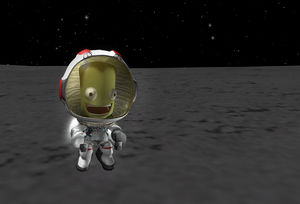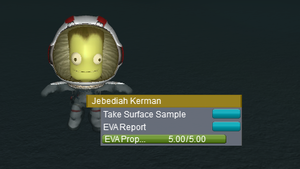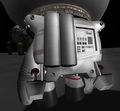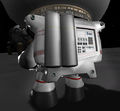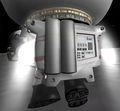Extra-Vehicular Activity
Extra-vehicular activity (abbr. EVA) is any activity performed by a kerbonaut when outside of a command pod. Kerbals have the ability to leave their pods and walk on the surface of a celestial body, collect scientific experiments, and perform untethered spacewalks. The Kerbals can navigate outside their spacecraft by climbing ladders, walking, or using their personal RCS jetpacks, which have a Δv of 600 m/s RCS fuel that is completely restored upon entering a command pod. An EVA suit can carry 5 units of EVA propellant, and as of the 1.11 update, up to 8 units with an EVA propellant tank. Prior to that version the jetpack fuel was represented by an arbitrary percentage that did not correspond to any other resource. Along with the change monopropellant was meant to be deducted from the spacecraft's tanks and place a cap on any given mission's EVA capability. However, a bug prevents that deduction from taking place, so jetpacks can still be refueled an unlimited number of times.
Jetpacking is impossible in more than 3.2 m/s2 gravity, including Kerbin, Eve, Laythe and Tylo. The largest planet on which the jetpack can lift a Kerbal off the ground is Duna. The engines of the jetpack have a thrust of about 270 newtons, which is slightly more than a quarter of the maximum thrust available by the stock RCS thrusters.
Contents
Uses
EVAs are useful for exploring the proximity of a craft; Kerbals on EVA can perform several useful actions by standing near certain objects. In career mode some activities can only be performed by a kerbonaut who has reached a certain level in certain specializations, or other improvement needed - this is indicated at the end of the description of the activity. The other game modes have no restrictions.
These are the tasks that may be performed:
- Repack a previously deployed parachute for another deployment (Right-click on parachute → Repack Chute).(Engineer level 1)
- Use an EVA Repair Kit to repair a broken deployable part (Right click on part → Repair).(Engineer level 1)
- Fix broken landing leg (Right-click on leg → Repair Leg). For this to succeed the leg must be only mildly damaged; a leg which has exploded or detached from the lander cannot be recovered.(Engineer level 2)
- Fix broken rover wheels (Right-click on wheel → Repair Wheel). For this to succeed the wheel must be only mildly damaged; a wheel which has exploded or detached from the ship cannot be recovered.(Engineer level 3)
- Extend or retract solar panels (Right-click on panel → Extend Panel/Retract Panel), even panels on otherwise uncontrollable vessels, e.g. a probe that ran out of power.
- Extend or retract ladders (Right-click on ladder → Extend Ladder/Retract Ladder)
- Plant a Extend-o-matic Series A1 Deployable Flag (commonly called flag) at their current position (Right-click on Kerbal → Plant Flag). This is only possible when the kerbal stands on the ground. Each kerbal is equipped with a single flag at the start of every EVA.(Astronaut Complex upgraded to level 2)
- Remove a previously planted flag (Right-click on flag → Remove Flag). The flag goes into their inventory and may be replanted at a new location.
- Read the plaque on a flag. While flags are listed in the Tracking Station and can be controlled and seen up close at any time, having a Kerbal in the vicinity is the only way to read the contents of their plaques.
- Board any unoccupied command module or EAS-1 External Command Seat- not necessarily the one they launched on. Before version 0.25, EVA was the only way to transfer crew during a mission. However, in version 0.25, a system for transferring crew between crew modules on the same ship was added. Left click on the hatch and click the "Transfer" button next to the name of the Kerbal.
- Produce an EVA report. Reports may be generated repeatedly during an EVA but only one may be returned to the ship for transmission at a time.
- Gather a surface sample. Surface samples can only be taken when the kerbal swims or stands on the terrain of a celestial body, and only one may be returned to the ship at a time.(R&D upgraded to level 2)
- Use an EVA Experiments Kit to conduct EVA Science. Only one experiment can be held at a time, although the experiment can be discarded to re-perform the EVA Science.
- Take the scientific results from experiments or cabins and store them in a command pod or lab. When the part is only reusable with cleaning by the lab or an restoration on EVA, this will block the part as well.
- Restoring used environmental sensors for reuse. (Right-click on sensor → Restore).(scientist)
- Place or move parts in EVA Construction Mode
- If you planned poorly or just burned too much and you do not have enough fuel to de-orbit, assuming you're actually orbiting the planet you want to be on, a Kerbal can disembark and use his RCS jetpack to provide a retrograde push and eventually allow a spacecraft to land. It might take a while, but the time spent pushing the spacecraft out of orbit might be a more attractive investment than financing another spaceflight to rescue your unfortunate astronaut(s). It will probably take multiple EVAs, and depending on your opinion of how RCS jetpacks refill without taxing the spacecraft's resources could be cheaty. Remember to save enough monopropellant to get back on board!
Controls
Regardless of whether you're on the ground or in the air, pressing U will toggle the spacesuit's lights (L was used before 1.2.1).
Ground
When a Kerbal on EVA is standing on a solid surface, the W, S, A, and D keys move him forward, backwards, left, or right respectively. The movement is relative to the camera, not relative to the Kerbal and they will turn to move in the requested direction if the camera was moved. Space will make them jump, and holding down ⇧ Shift will allow them to run. Kerbals can also swim in bodies of water or other liquids they encounter; the movement controls are the same as on solid ground.
Free fall
When a kerbonaut loses his footing, jumps, or releases a grip on a vehicle, he enters free fall. The controls function somewhat differently in this situation. Kerbonauts in this mode of travel have a fixed orientation such that their head is always pointing north on the equatorial plane. They may rotate around this axis only. One consequence of this limitation is that if the crew hatch is oriented south of the equatorial plane, the kerbonaut will only be able to bump against it with his helmet making access more difficult with sometimes fatal consequences. Before starting an EVA, if you are planning on returning to the ship, the craft should be oriented such that the Kerbal can touch the hatch with his hands or feet. Additionally, because of Kerbals' need to always having their heads aligned to the north, attempting to do EVA maneuvers without being in orbital camera mode can be very frustrating.
The most important control in EVA may be this: Space will rotate the active Kerbal to match the camera direction (placing his back to you), but he will still keep his head-north orientation. Knowing what direction you are pointing is critical to successful EVA.
Pressing R will activate a Kerbonaut's RCS jetpack. If he is in midair, he will attempt to automatically reorient to face away from the camera on the axis perpendicular to the equatorial plane. W, S, A, and D will move him respectively forward, backward, left, and right relative to the direction he is looking. ⇧ Shift and ^ Control will move him up and down. Another important consequence of Kerbals' constant northward orientation is that if you wish to maneuver toward something that is indirectly above or below you, you will need to combine vertical and horizontal controls, because unless the destination is on the same plane as the kerbonaut, he cannot point directly at the target on the navball and accelerate like a craft would.
When performing extended EVAs, make sure to check the map display periodically, because although RCS jetpacks do not provide much thrust at all, Kerbals are relatively light and do not need a lot of thrust to significantly impact their velocities. As a result, although you might be concentrating on maneuvering close to your target or moving around a vessel, you are ultimately affecting your velocity and a Kerbal on EVA is just another thing in orbit. Make sure that all of your maneuvering does not cause your orbit to decay. Kerbals are hardy little guys but they don't handle atmosphere re-entry very well on their own.
Ladders
Press F to grab onto nearby ladders or other handholds (a prompt will be visible onscreen when the kerbal is in a position where this is possible). While holding on, use W and S to climb up or down, or A and D to transition to nearby perpendicular ladders. If the Kerbal is clinging to a command module's hatch, pressing B will board the vehicle. Pressing Space while on a ladder will release the kerbonaut's grip, allowing him to fall or float away.
Trivia
- In older versions Kerbals could survive re-entry in EAS-1 External Command Seats or floating on their own like anything else, since the game had not implemented damage from atmospheric drag or heating. The jetpack does not have enough thrust to arrest their fall in Kerbin's gravity so without additional equipment they will not survive hitting the ground. However, a glitch/easter egg may cause a Kerbal hitting the surface of Kerbin (no confirmation in other spots) to bounce. This can be done reliably by letting the Kerbal hit the ground head-first.
- According to the Kerbal Knowledge Base, a Kerbal on EVA masses 0.09 tonnes, and as of the 1.11 update, Kerbals now add mass to a vehicle when boarded.
- A Kerbal riding in an EAS-1 External Command Seat still functions as being on EVA for many gameplay purposes. Amongst other things, the mass of a Kerbal sitting in the Command Seat counts towards the total mass of the craft; if the Command Seat is attached radially, this can even noticeably throw off the centre of mass for small, lightweight craft. Note also that mounting an External Command Seat will not refill a Kerbal's jetpack fuel supply.
- The jetpack can provide enough Δv to place a Kerbal into orbit from the surface of Minmus or a smaller body.
- Before 0.25, EVA was the only way to transfer a Kerbal between cabins.
- Tourists may not perform EVAs.
Gallery
Changes
- On EVA the results of experiments can be taken out.
- Surface samples and EVA reports can be created on EVA.
- Overhauled the Kerbal Face Expression System with new animations, which are also visible on EVA.
- Fixed the EVA map icons not showing.
- Fixed EVA light orientations.
- 0.18.3 (Demo)
- Fixed EVA light orientations.
- Boarding a vessel from EVA no longer toggles the vessel's SAS state.
- The Q and E keys can now be used to control yaw with the EVA Jetpack
- Added a game setting to disable the automatic orientation when pressing any of the WSAD keys while jetpacking on EVA.
- Implemented dynamic walk cycle blending for EVA Kerbals under G levels between 0.17 and 1G
- Initial release
- Added key and axis bindings for EVA controls. Reorganized the Input Settings screen a little.
- Added 1:1 EVA rotation axes. Using them disables the automatic orientation system.
- Added separate control bindings for walking and jetpacking on EVAs.
See also
- Extra-Vehicular Activity on Wikipedia
